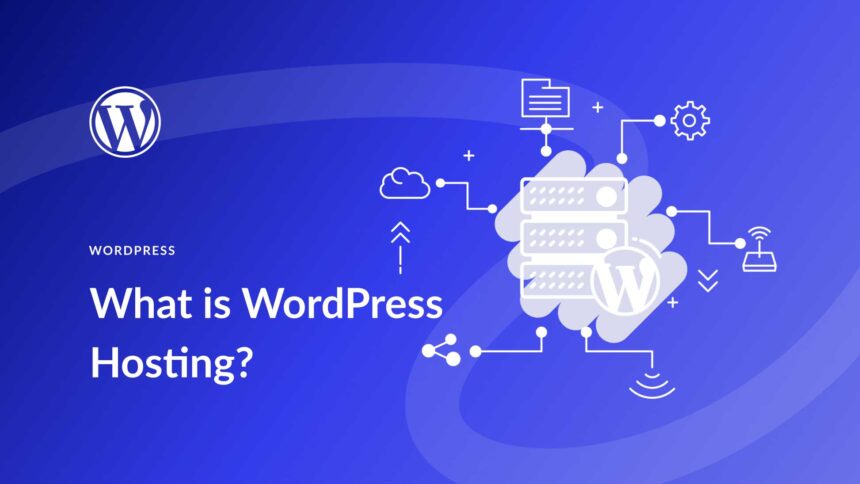When it comes to launching and maintaining a WordPress website, one of the most critical decisions you will face is choosing the right hosting provider. WordPress hosting can impact everything from website performance to security, and the wrong choice can result in sluggish load times, frustrating downtime, or even security vulnerabilities that compromise your data.
The three main types of WordPress hosting—Shared Hosting, VPS Hosting, and Dedicated Hosting—offer different levels of performance, control, and cost. But how do you choose the right one for your specific needs? Should you go with the most budget-friendly option, or should you opt for something more robust to handle growth? Let’s take a deep dive into these three hosting types and explore their pros, cons, and who each type is best suited for.
What is WordPress Hosting?
Before we dive into the specifics of Shared Hosting, VPS Hosting, and Dedicated Hosting, let’s define what WordPress hosting is. Simply put, WordPress hosting is a hosting solution that has been optimized specifically to run WordPress websites. This includes features such as automatic WordPress installation, WordPress-specific caching, and even tailored security protocols. The goal is to ensure that your WordPress website runs smoothly with maximum performance.
Most WordPress hosting services come with pre-configured environments that make it easier for you to get started, even if you don’t have technical expertise. Hosting providers typically offer different plans based on the size of your website and the amount of traffic you expect to attract.
Now, let’s take a closer look at the three most common types of WordPress hosting: Shared Hosting, VPS Hosting, and Dedicated Hosting.
Shared Hosting: The Entry-Level Option for Budget-Conscious Users
What is Shared Hosting?
Shared Hosting is the most affordable and beginner-friendly option for WordPress websites. In this setup, your website shares server resources with many other websites on the same server. This means that the cost of maintaining the server is divided among multiple users, making it the most cost-effective option. Shared hosting providers often offer basic, out-of-the-box features, with little to no need for technical intervention on your part.
Pros of Shared Hosting
- Affordability: One of the most significant advantages of shared hosting is its price. Hosting plans can range anywhere from $2 to $10 per month. For individuals or small businesses just starting out with WordPress, shared hosting provides an inexpensive entry point.
- Ease of Use: Shared hosting providers typically offer user-friendly control panels (like cPanel) and a simple one-click WordPress installation. This makes it incredibly easy for beginners to get their websites online without worrying about server management.
- Maintenance-Free: Shared hosting is fully managed by the hosting provider, meaning they handle server updates, security patches, and technical support. As a website owner, this reduces the workload considerably, allowing you to focus on content creation instead of server administration.
- Ideal for Small Websites: If you are running a personal blog, a portfolio website, or a small business website, shared hosting offers all the features you need to launch your website at a low cost.
Cons of Shared Hosting
- Limited Resources: Since your website shares server resources with other websites, you’re dependent on how much traffic those other sites generate. If one website experiences a surge in traffic, it can slow down the entire server, which negatively affects your website’s performance.
- Scalability Challenges: As your website grows and starts to attract more visitors, shared hosting may not be able to keep up. You may face issues like slower loading times or downtime, which can hurt your website’s user experience.
- Security Risks: Since you are sharing a server with multiple websites, a vulnerability in one website can potentially compromise the entire server. Shared hosting lacks the advanced security features of more robust hosting options, which can be a concern for business websites or sites that handle sensitive information.
- Lack of Customization: Shared hosting offers limited customization. You cannot install custom software, and you have very little control over server configurations. This can become restrictive as your website grows and your needs become more complex.
Who Should Choose Shared Hosting?
- Personal Blogs: If you’re a hobbyist blogger and aren’t expecting massive traffic, shared hosting can handle your website’s needs without the high price tag.
- Small Business Websites: Small local businesses or startups with a simple website may find that shared hosting offers the right balance of cost and functionality.
- Non-Ecommerce Websites: Websites that don’t handle sensitive customer data or financial transactions (e.g., blogs, informational websites) are a good fit for shared hosting.
Best Shared Hosting Providers for WordPress
Some well-known shared hosting providers that are optimized for WordPress include Bluehost, SiteGround, and HostGator. These hosting services are known for their strong customer support, simple WordPress integration, and reliable uptime.
VPS Hosting: The Middle Ground for Growing Websites
What is VPS Hosting?
VPS Hosting, or Virtual Private Server Hosting, is a more powerful and flexible option compared to shared hosting. While you still share the physical server with other websites, each user is allocated dedicated resources, such as CPU, RAM, and storage. Think of it as having your own mini-server within a shared environment. VPS hosting offers more control, better performance, and greater scalability than shared hosting.
Pros of VPS Hosting
- Better Performance: With VPS hosting, your website is allocated a specific portion of server resources. This means you have more consistent performance and can avoid slowdowns caused by other websites on the server.
- Scalability: VPS hosting is highly scalable. As your website grows, you can easily increase your resources (such as RAM and CPU) without needing to migrate to another hosting plan. This makes VPS hosting a great choice for websites that are expected to grow over time.
- Greater Control: VPS hosting provides more control over your hosting environment. You can install custom software, configure server settings, and have greater flexibility in how your server operates.
- Improved Security: While VPS hosting still involves sharing a physical server, the resources are isolated between each user. This makes it more secure than shared hosting. You can also implement additional security measures, such as firewalls and custom configurations, to protect your website.
- Root Access: With VPS hosting, you have root access to the server. This means you can configure your server as you see fit, allowing for custom software installations and settings.
Cons of VPS Hosting
- Higher Cost: VPS hosting costs more than shared hosting. Prices typically range from $20 to $80 per month. While it’s a great middle ground, it’s still more expensive than shared hosting.
- More Technical Expertise Required: VPS hosting is more complex than shared hosting and often requires a basic understanding of server management. Some providers offer managed VPS hosting, where they handle the technical aspects, but if you opt for unmanaged VPS hosting, you will need to be more hands-on.
- Still Limited Resources: While VPS hosting provides dedicated resources, it’s still not as powerful as dedicated hosting. If your website grows significantly, you may eventually need to upgrade to a dedicated server.
Who Should Choose VPS Hosting?
- Growing Websites: If your website is outgrowing shared hosting but you’re not ready for the expense of a dedicated server, VPS hosting is the ideal solution. It offers enough power and flexibility for websites that need more resources.
- E-commerce Websites: E-commerce sites require reliable performance and security to handle customer transactions. VPS hosting provides the resources and control necessary for these types of websites.
- Businesses with Traffic Fluctuations: If you have a website that experiences traffic spikes or seasonal fluctuations, VPS hosting provides the scalability needed to handle these changes without downtime.
Best VPS Hosting Providers for WordPress
Some reputable VPS hosting providers that offer WordPress-optimized plans include Liquid Web, InMotion Hosting, and DigitalOcean. These providers offer robust VPS solutions with performance and support that cater to WordPress users.
Dedicated Hosting: Maximum Power and Control for Large Websites
What is Dedicated Hosting?
Dedicated Hosting is the most powerful, customizable, and expensive option available for hosting WordPress websites. With dedicated hosting, your website has an entire server all to itself. Unlike VPS and shared hosting, you do not share resources with other users, which means you get all the CPU, RAM, and storage power of the server.
Dedicated hosting is ideal for large websites with significant traffic or complex configurations that require maximum performance. This type of hosting is not for everyone but is essential for websites that need the best possible performance, security, and control.
Pros of Dedicated Hosting
- Unmatched Performance: With dedicated hosting, you have the entire server to yourself, meaning no sharing of resources with other websites. This guarantees optimal performance and fast load times, even under heavy traffic.
- Complete Control: Dedicated hosting gives you complete control over your server. You can configure it as you see fit, install custom software, and have full access to the server’s settings. This level of control is unmatched by VPS or shared hosting.
- Top-Notch Security: Dedicated hosting provides the highest level of security. Since you are the only user on the server, you can implement your own security protocols and updates. This makes it an excellent choice for websites that handle sensitive data, such as financial transactions or personal information.
- Custom Resources: Dedicated hosting allows you to fully customize the server resources you need (CPU, RAM, bandwidth, storage). This level of flexibility makes it an ideal choice for websites that need large amounts of resources for complex applications.
Cons of Dedicated Hosting
- High Cost: Dedicated hosting is the most expensive hosting option, with prices starting around $100 per month and increasing based on the server’s specifications. This can be a significant investment for small businesses or individuals.
- Technical Expertise Required: Managing a dedicated server requires advanced technical knowledge. If you don’t have the expertise to manage a server, you will either need to hire a server administrator or opt for managed dedicated hosting, which comes at an additional cost.
- Server Maintenance: While the hosting provider may handle basic maintenance tasks, you will still be responsible for more advanced server configurations, software updates, and security patches.
Who Should Choose Dedicated Hosting?
- Large Enterprises: Large businesses and enterprises with high-traffic websites need dedicated hosting for its performance and scalability. This is especially true for sites with millions of visitors or complex applications.
- E-Commerce Platforms: E-commerce websites require the highest level of security and performance to handle customer data, transactions, and large product catalogs.
- Websites with Complex Needs: If your website requires custom server configurations, specialized software, or a high level of customization, dedicated hosting gives you the flexibility to tailor the environment to your needs.
Best Dedicated Hosting Providers for WordPress
Leading providers of dedicated hosting for WordPress include Bluehost, Liquid Web, and HostGator. These providers offer excellent customer support, performance, and security for websites requiring maximum power.
Conclusion: Which WordPress Hosting Is Best for You?
Choosing the best WordPress hosting plan depends on your website’s size, growth potential, budget, and technical expertise. Here’s a quick recap of when to choose each hosting type:
- Shared Hosting: Ideal for small websites, blogs, and personal projects on a budget. Perfect for beginners who don’t need advanced resources.
- VPS Hosting: Best for growing websites that need better performance, scalability, and control without the high cost of dedicated hosting.
- Dedicated Hosting: Perfect for large, high-traffic websites that need maximum performance, customization, and security.
By considering factors such as website size, expected growth, budget, and technical knowledge, you can make an informed decision about which WordPress hosting option is best for your needs.









